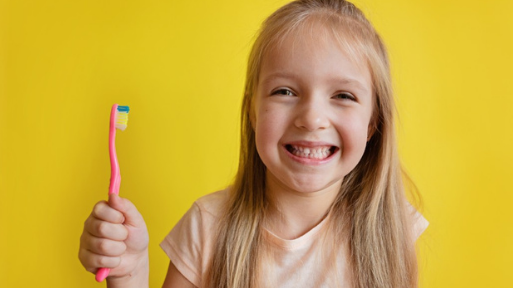Are You Overbrushing Your Teeth?

You hear a lot about how important it is to brush your teeth — but could you be overbrushing them? Overbrushing is actually a very common problem and is usually seen in people who brush too vigorously with medium- or hard-bristled toothbrushes.
Is overbrushing really that bad?
Brushing regularly is necessary for healthy teeth and gums, but you can overdo a good thing. When you brush too hard, you can wear down your enamel. Enamel loss means less protective coating for your teeth, which can cause your teeth to become sensitive to hot and cold. Brushing too hard can also damage tender gum tissue and can eventually cause it to recede, exposing tooth roots, increasing sensitivity, and leaving them vulnerable to disease and decay.
When is a Good Time for Invisalign?
 If you’re feeling self-conscious about your crooked smile but don’t want standard braces, Invisalign might be a great option for you. Invisalign® are clear aligners that are used as orthodontic devices to straighten your smile. The treatment involves wearing a series of clear aligners over a period of several months, with each successive set of aligners moving teeth closer to a straighter position. Here are some things to consider to determine when it’s a good time for Invisalign:
If you’re feeling self-conscious about your crooked smile but don’t want standard braces, Invisalign might be a great option for you. Invisalign® are clear aligners that are used as orthodontic devices to straighten your smile. The treatment involves wearing a series of clear aligners over a period of several months, with each successive set of aligners moving teeth closer to a straighter position. Here are some things to consider to determine when it’s a good time for Invisalign:
- Length of treatment: While some patients can see a marked improvement in their smile in as quickly as 2 months, the majority of Invisalign® patients wear their aligners for about 12 months. Depending on the severity of the problem, your custom treatment plan may last eight months, 12-18 months or longer.
Top 5 New Year’s Resolutions for Your Smile
 New year, new you, right? The start of a new year is a perfect time to make resolutions to improve your smile. Why? Because a healthy smile is more than just shiny white teeth. In many instances, the health of our teeth and gums directly correlates to the rest of our bodies. Here are five resolutions you can incorporate into your daily routine for a healthier you:
New year, new you, right? The start of a new year is a perfect time to make resolutions to improve your smile. Why? Because a healthy smile is more than just shiny white teeth. In many instances, the health of our teeth and gums directly correlates to the rest of our bodies. Here are five resolutions you can incorporate into your daily routine for a healthier you:
- Eat more fruits and vegetables. Fruits and vegetables are packed with super nutrients that fight off bacteria and inflammation to help keep teeth and gums healthy. Vitamin-packed fruits and veggies vitamins will also strengthen your tooth enamel and naturally help clean your teeth. Of course, they’ll also boost your immune system and keep you healthier all around.
- Stop smoking. Quitting smoking is another resolution that your whole body will thank you for, your teeth included. Not many people realize the damage smoking causes to your mouth. In addition to discoloring and yellowing your teeth, tobacco use increases the chance of oral and throat cancers and gum disease. Quitting may be difficult but it’s worth it.
- Brush and floss regularly. This is an important routine you should be doing already but sometimes life gets busy and we forego these simple tasks. Be sure to brush twice a day and take the time to floss at least once a day, preferably before going to bed to reduce plaque and tartar build-up.
- Drink more water. This is another resolution that will help you feel and look better all over. Try to drink approximately eighty ounces of water each day to keep your mouth hydrated. Water helps keep your mouth clean by washing away plaque and acid build-up from foods throughout the day.
- Visit your dentist. Make a resolution to see your dentist this year. In fact, dentists recommend 2-4 cleanings a year. Regular visits can help keep your mouth clean and strong, as well as help discover any potential issues before they get worse.
Schedule an Appointment
If you’re ready to make 2021 the year of your healthiest, brightest smile yet, make an appointment with us today!
The Connection Between Diabetes and Oral Health
 Diabetes is a very common disorder that affects your body’s ability to process sugar. There are two types of the disease, both of which can result in high blood sugar levels. Uncontrolled blood sugar levels can cause problems throughout your body, including the eyes, nerves, and heart. But did you know that those with diabetes are at higher risk for oral health issues, too?
Diabetes is a very common disorder that affects your body’s ability to process sugar. There are two types of the disease, both of which can result in high blood sugar levels. Uncontrolled blood sugar levels can cause problems throughout your body, including the eyes, nerves, and heart. But did you know that those with diabetes are at higher risk for oral health issues, too?
Why People with Diabetes Are More Prone to Oral Health Issues
Periodontal disease, also referred to as gum disease, is a chronic, inflammatory disease that can wreak havoc on your gums, as well as the surrounding tissue and bone. Periodontal disease is the most common dental disease affecting those living with diabetes because diabetes impairs the body’s ability to fight infection and slows healing time. As with all infections in the body, gum disease can cause blood sugar to rise, making diabetes even harder to control. This can lead to decreased immunity and an increased susceptibility to worsening oral infections.
Certain medications for diabetes can also put a patient at risk for dental caries. Some antibiotics, for example, can cause dry mouth and worsen other oral symptoms. People with Type 2 diabetes are also more prone to bad breath, dental caries, and cavities due to dry mouth and thrush, which is a common fungal infection caused by the yeast Candida albicans that grows in high-sugar environments.
Is it Safe to Visit My Dentist Now?
 We understand there’s a lot of uncertainty about what is safe and what is not in the midst of the COVID-19 pandemic. Though it’s still an ongoing situation, it’s considered safe for you to visit your dentist for routine patient care. The American Dental Association has advised dental offices on steps and precautions to take to help protect patients and staff. Here at Michael Fernandez Family Dentistry, we’re taking extra steps to keep you safe, too. Here are a few of our new protocols and office enhancements amidst the pandemic:
We understand there’s a lot of uncertainty about what is safe and what is not in the midst of the COVID-19 pandemic. Though it’s still an ongoing situation, it’s considered safe for you to visit your dentist for routine patient care. The American Dental Association has advised dental offices on steps and precautions to take to help protect patients and staff. Here at Michael Fernandez Family Dentistry, we’re taking extra steps to keep you safe, too. Here are a few of our new protocols and office enhancements amidst the pandemic:
- We take your health seriously. In addition to every member of our team wearing a mask at all times, all of our staff members directly involved in patient care will be wearing face shields and gowns when appropriate.
- We’re screening our staff and our visitors. In addition to screening staff daily for symptoms, we’re also screening patients prior to all appointments. This screening protocol will include a brief questionnaire, as well as taking patient temperatures in an effort to identify any potential risk for transmitting COVID-19.
- We’re purifying the air and routinely disinfecting the office. We recently had in-duct air purifiers installed in the office, both of which purify every cubic inch of air that our central air conditioning system reaches. We’re also taking extra precautions with cleaning our reception areas by wiping down all surfaces with approved cleaners. We’ve also removed magazines and the coffee machine to cut down on shared surfaces.
- We’ve staggered appointment times. In an effort to limit the number of patients in our office at a time, we’re staggering appointment times.
Why Soft Toothbrush Bristles are Your Best Choice

We all know that brushing your teeth regularly is an important part of maintaining good dental health. But did you know that choosing the right kind of toothbrush also matters? With all of the toothbrushes available on the market today ranging from soft to medium to hard, electric and manual, it can be difficult to know which toothbrush is the best one for you.
Soft is better
When choosing a toothbrush, whether electric or manual, it’s best to opt for a soft-bristled brush. Anything coarser will actually wear away your enamel and gums. The same advice goes for pressure in brushing—harder brushing does not equal better brushing. Many people brush too hard, especially with hard-bristled toothbrushes, and can damage sensitive gum tissue and their gum line. Thus, softer brushes cause less irritation while still effectively removing plaque and tartar buildup.
Top 5 Winter Dental Tips

You may not think of oral hygiene when cold winter weather hits, but you should. As we head into the cooler months, it’s important to know how to help keep our lips, teeth, and gums healthy. Below are five tips to help keep your oral health in tip-top condition while you fight the winter chill.
1. Don’t forget your lips! Dry and chapped lips are a common problem in cold weather. Your lips are a part of your overall oral health and it’s important to protect them from exposure to cold weather, high winds, and UV rays (even on those overcast days). Wearing a daily lip balm with at least an SPF 15 and drinking plenty of water to hydrate your skin can help protect your lips this winter.
How Many Times a Day Should I Brush My Teeth?

Twice a day keeps the germs away! According to the American Dental Association, you should brush your teeth at least twice a day. The general rule of thumb is to brush before each meal and before bed. And remember, you should brush your teeth for approximately two minutes each time you brush.
Brushing alone, however, isn’t everything. A proper dental hygiene routine consists of a healthy diet, brushing, flossing, and then rinsing your mouth out with mouthwash.
Why do I need to brush my teeth so often?
When you brush your teeth, you help remove food and plaque (that sticky white film that clings to your teeth and contains bacteria). After you eat a meal or snack that contains sugar, the bacteria in plaque produce acids that break down tooth enamel and eventually cause cavities. Plaque that isn't removed can also harden into tartar which makes it even harder to keep your teeth clean. Even more seriously, plaque and tartar build-up can lead to gum inflammation and gum disease, which further increases your risk for oral health issues!
3 Ways to Improve Your Dental Hygiene Routine

Chances are you already know the basics of good oral hygiene. Brush twice a day, floss, avoid sugary foods. But what else can you do to improve your oral health routine? Here are 3 more tips to keep your smile happy and healthy.
- Make dental hygiene a part of your entire day. While it’s obviously important to make time to brush and floss regularly, there are other things you can do throughout the day to improve your dental hygiene. To make each day better for your teeth, try including these small habits: don’t snack or drink anything except water before bed, chew sugar-free gum after you eat to remove food particles that stick to your teeth, and stay hydrated all day to encourage natural saliva production!
- Start with your back teeth. Starting a brushing session with your back teeth is a great way to give the back of your mouth the attention it deserves! Cleaning your back teeth is essential because all of those nooks and crannies in your molars make them more susceptible to gum disease, cavities, and decay.
- Brush your tongue. Brushing your tongue is a great addition to your oral health regimen. Your tongue is a perfect place for bacteria to grow and it’s important to take a few extra seconds to brush this area. Not only can plaque and germs live on your tongue and sneak into the crevices between your teeth causing cavities, but an unbrushed tongue can also lead to bad breath. Use your toothbrush or a tongue scraper to keep your mouth healthy!
Schedule an Appointment
We’d be happy to talk to you more about creating a healthy dental hygiene routine. Make an appointment with us today and we’ll get you on your way to a better smile!
What to Consider When Searching for a Dentist in Virginia Beach

When you’re looking for a new dentist, you’re searching for more than someone to just clean your teeth. Your dental health, and your family’s, is a crucial part of your overall health and so choosing a dentist that’s right for you is an important decision. So, how do you find the best dentist for you? Here are some important factors to keep in mind.
Services provided
Another factor to consider when choosing a dentist is if they offer a variety of services that work for your needs. Maybe you don’t need a bridge or porcelain veneers right now, but you might one day—and you don’t want to have to start all over again when you do!
If you’re also searching for a dentist for your family, you will want to consider someone who offers a variety of services, from children’s dentistry to cosmetic, restorative and emergency dental care. Typically, you can find all the services offered on the practice’s website.
What Are Implant-Retained Dentures?

Dentures are removable replacements for missing teeth and surrounding tissues. They’re typically made of acrylic resin, sometimes in combination with various metals. While most dentures rest directly on the gums, dentures that attach to implants are called implant-retained dentures.
Advantages of Implant-Retained Dentures
Because implant-retained dentures are attached to implants, they are much more stable than traditional dentures. Because they shift less, they are usually more comfortable to wear and allow for easier eating and less worry about becoming loose or falling out.
Implant-retained dentures can also help preserve your jawbone and keep it strong and intact. Because traditional dentures are used to replace missing teeth, the jawbone can deteriorate over time and result in receding gums and a collapsed smile. However, because implant-retained dentures work with the implants that act as natural teeth and roots, they fuse with your jawbone in a way that keeps it healthy and stable.

